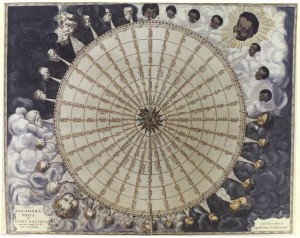This month’s contributions form a sachet of assorted potpourri, each with its own flavor and scent.
Our writers create elaborate new worlds in their pieces. Fantasy novelist Alexis Kennedy, author of Bound through Blood, excerpted in this issue, develops a universe of vampires and their human lovers and victims, suffused with the mythology of the old American South and the need to understand one’s history to embrace one’s destiny. We also include the introduction from Carol Staff’s The Return of the Necromancers, a complex piece inspired by medieval European history, involving royalty, merchants, mines, village markets and evil supernatural forces.
Staff looks at her world-building as a means of escape, creating another world to enter when our own becomes harsh. Her realm, Danovian, is no gentle paradise for its inhabitants, as plenty of tragedy occurs by accident as well as through revenge and malice. But it is a place where good, evil and loyalty matter, and there are redeeming elements, both within the story itself and through her act of transforming her stress into a new creation.
Poet Dave Douglas illustrates the fear and implicit conflict and violence within our own reality and our own minds through his piece “The Machine,” comparing our minds to an inner-city law enforcement drama. Karl Schonborn’s memoir Cleft Heart, Chasing Normal, reviewed here by Bruce Roberts, explores the inner and external conflict brought about by bullying and exclusion of those who look different. The author was harassed as a child because of his cleft palate, which inspired him to research and teach on nonviolent communication.
Karl Wolff’s essay collection On Being Human, reviewed by Christopher Bernard, looks into what our philosophy, actions, popular culture, religion and science have suggested over the past centuries about who we are and the meaning and value of human life. Bernard, and other thinkers, speculate that our current worldviews may not adequately equip us to sustain life on this planet. We may need to do more work to create our inner worlds if we hope to survive.
Lysious Ogolo’s short story “Lost but Found Love” illustrates the psychology of grief, as Jane, the protagonist, goes through a variety of feelings and experiences after the supposed death of her partner.
In her monthly Book Periscope column, Elizabeth Hughes reviews Rita D’Orazio’s Italian immigrant family saga novels Don’t Look Back and Katerina, as well as Lisa Henthorn’s young women’s fiction piece 25 Sense and Michelle Bellon’s romantic suspense novel Rogue Alliance. D’Orazio, Henthorn and Bellon’s books present characters with difficult pasts, who must heal from a variety of losses and mistakes in order to be able to trust again. Their inner landscapes become as much a part of the setting of their stories as the government top-secret research facility, corporate office, or California immigrant communities where they live.
Opera San Jose’s production of Madama Butterfly also relates an emotional tragedy, young geisha Cio-Cio San’s abandonment by her husband. Reviewer Holly Sisson focuses in on how the atmospheric music and floral sets entrance the audience and bring them into the story so they mourn along with the main character as her “American Dream” collapses.
Essayist Ayokunle Adeleye also discusses something commonly associated with the American Dream, but which is in fact a goal and path out of poverty for many people worldwide: entrepreneurship. In his two columns, he advocates that his Nigerian compatriots launch their own businesses, and cautions them about expanding too quickly and overextending their capital.
A wide variety of poets evoke sensations and landscapes through their words. Amy Huffman brings us to a beach harbor, where we watch ship sails move in and out with gusts of wind and waves grind rocks into sand at water’s edge. Virginie Colline condenses her thoughts down to haiku, showing us cats’ eyes, ice, and ocean waves with an intense focus on a single image. Perhaps Twitter, and the emerging literary form of microfiction, represents a modern Western resurgence of haiku?
Jenny Williamson also looks to water for inspiration, reminding us of its presence throughout our bodies and the natural world, and thus suggesting our kinship with the rest of the planet. Kenyatta Jean-Paul Garcia writes with a different, somewhat songlike rhythm, and draws upon Biblical and historical imagery to convey the journeys of humanity and life as if they were gentle conversations. In his first piece he uses a water droplet from the Garden of Eden to reflect creative nourishment, reminiscent of Williamson’s themes.
Portuguese writer Rui Carvalho creates a colorful, fanciful world of emotion and life in his pieces, yet grounds them in a form of reality with percentages, names, and facts. Poet Bruce Roberts brings the sound of his radio, and other physical sensations, to the page, and Neila Mezynski gives us a humorous ode to the joys of overindulging in cake.
Please enjoy the cacophony of sensations that is this month’s issue of Synchronized Chaos Magazine! Our writers invite you to step forward, pick up your backpacks and trail mix, and venture forth into their new worlds.

